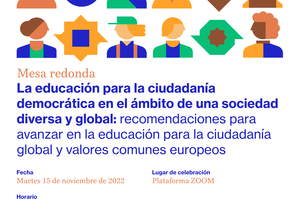National roundtable on Global Citizenship Education in Spain

On 15 November 2022, Fundación CIVES organized the on line national roundtable “Education for democratic citizenship in a diverse and global society: recommendations for advancing global citizenship education for global citizenship and common European values”, in the framework of BEST project, which includes a line of intervention focused on political advocacy at national and European level.
Together with the President and Vice-President of Fundación CIVES, the event was attended by the Spanish MEP Domènec Ruiz Devesa for the S&D group and representatives of other Spanish non-governmental organizations such as Liga Española de la Educación, FUHEM, Amnesty International, APDHE and the Movement for Transformative Education and Global Citizenship (composed by Alboan, Oxfam-Intermón, Entreculturas and InteRed).
During 2020, some of these civil society organisations participated together with Fundación CIVES in a coordinated work on the drafting of a joint proposal of amendments to the Draft Education Law (LOMLOE), which was shared with political parties in the Congress of Deputies, the Minister of Education and Vocational Training and the Secretary of State for Education and
Vocational Training.
Among the conclusions reached during the event were the following:
- The need for the existence of a specific subject in the school curriculum such as Education for Global Citizenship. As well as the need for transversality: this means that it has to permeate all the behaviour of the educational community, being incorporated into the daily practice of the centre.
- Human rights, gender equality, eco-social education, respect for cultural differences, sustainable development, peaceful conflict resolution, etc. are considered essential contents to be addressed in such a subject.
- It is necessary to make the classroom a suitable space for fostering critical thinking in students and for participation and experimentation, and a citizen's conscience ready to defend global democratic values.
- The importance of initial and in-service teacher training to address these challenges.
- It is necessary to develop teaching materials in line with this, which can help teachers in their daily work.
- Finally, the importance of the union of social organisations for political advocacy and networking is pointed out.